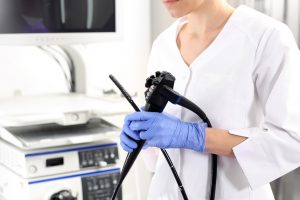
A colonoscopy offers the best protection against colon cancer, the third-leading cause of cancer death. Studies suggest that colonoscopies reduce deaths from colorectal cancer by 60 to 70 percent (source: National Cancer Institute).
Colonoscopy is the Most Comprehensive Colon Cancer Screening
Colon cancer begins as an adenoma (abnormal growth) in the colon or rectum called a polyp. During a colonoscopy, a doctor can detect and remove polyps before they develop into cancer.
Other colon cancer screenings like fecal occult blood tests or stool DNA tests can detect the presence of blood or DNA biomarkers in the stool, but they cannot be used to confirm a diagnosis of colon cancer. A colonoscopy is the only screening that includes a visual exam of the entire colon and rectum. Using a colonoscope, a gastroenterologist can view the colon on a screen and remove any developing polyps.
The rate for detecting these polyps is the adenoma detection rate (ADR), and you should be looking for a physician with an ADR of at least 15 percent in women and 25 percent in men.
Colonoscopies Detect Cancer Earlier than any Other Test
Colonoscopies are essential because colon cancer is highly treatable when it is found early. In fact, colon cancer is over 90 percent treatable in the early stages. When colon cancer reaches an advanced stage, it is no longer contained in the colon and has metastasized to other organs.
People rarely experience symptoms in early stage colon cancer, so you cannot rely on physical sensations. At diagnosis, many patients claim to feel fine and say that there was nothing to alert them that they had colon cancer. Warning signs like abdominal pain, bloody stool, rectal bleeding and weight loss are often indicators of advanced stage colon cancer, which is challenging to treat.
Call a Gastroenterologist
If you are 50 or older, talk to your doctor about getting a colonoscopy. If you are African American, you should get screened beginning at age 45. Other risk factors, like family history, could also lower your screening age, so make an appointment so you can get screened appropriately.
